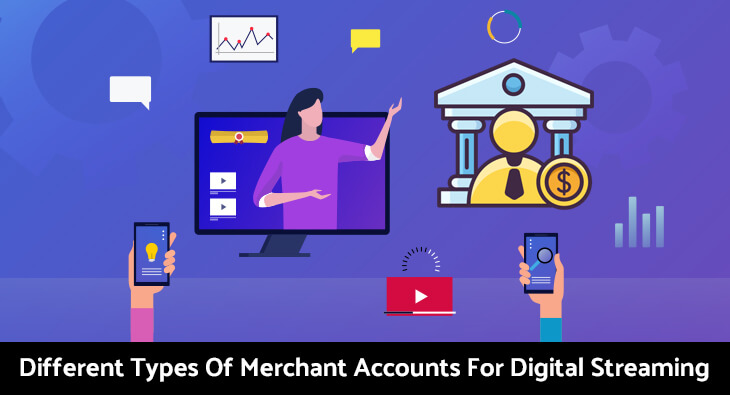Are you a digital streamer looking to find the best merchant accounts for digital streaming business? Then look no further! In this blog post, we will be exploring the different types of merchant accounts for digital streaming to help you determine. Which one is the best fit for your needs. With the ever-growing digital streaming industry, having the right merchant account is essential for success. We’ll take a look at the advantages and disadvantages of each type of merchant account. So you can make an informed decision. So let’s dive into the world of merchant accounts for digital streaming!
What is a merchant account?
A merchant account is essentially a type of bank account that allows businesses to accept payments via debit and credit cards. Merchant accounts for digital streaming are vital for businesse. Such as digital streaming services. As they allow customers to make secure and convenient payments without having to worry about cash transactions or checks.
Merchant accounts also provide businesses with a variety of payment processing options. Which makes it easier for them to cater to different customer preferences. By having a merchant account, businesses can offer their customers a seamless payment experience. Which can help them build trust and credibility with their audience.
Some Related Blogs
- How to Get a Merchant Account for Your Non-Profit Business
- Tips on Finding the Right Survival Preparation Merchant Account
- 5 Reasons Why Schools Need Payment Processing
- Set Up Credit Card Processing for Dispatch Services Companies
What are the different types of merchant accounts?
Merchant accounts are crucial for businesses, including those in the digital streaming industry. They allow businesses to accept payments from customers using debit and credit cards, e-wallets, and other forms of electronic payment.
Types of merchant accounts?
When it comes to merchant accounts, there are different types that businesses can choose from. Let’s explore them:
1. Traditional Merchant Accounts:
This is the most common type of merchant account. And it requires the business to have a direct relationship with a bank. These accounts come with processing fees and may require a lengthy application process. However, traditional merchant accounts are reliable and secure.
2. Aggregator Accounts:
Aggregators like PayPal, Stripe, and Square provide merchant accounts that are ideal for small businesses. With aggregator accounts, businesses can quickly set up their payment processing, and the fees are lower than traditional accounts. However, they come with certain limitations, such as lower transaction limits and higher fees for chargebacks.
3. Offshore Merchant Accounts:
Offshore merchant accounts are for businesses that want to expand internationally. They allow businesses to accept payments in multiple currencies and are useful for businesses. That operate in countries with strict regulations. Offshore accounts come with higher fees and stricter requirements for approval.
4. High-Risk Merchant Accounts:
Businesses in industries such as gambling, adult entertainment, and online pharmaceuticals fall under the high-risk category. High-risk merchant accounts are designed for such businesses that have higher chances of chargebacks and fraud. The fees and approval process for these accounts are more strict.
Choosing the right type of merchant account for your digital streaming business depends on your needs and budget. Factors such as the volume of transactions, your target market. And your business model will determine which type of merchant account is the best fit for your business.
As a digital streaming business. It’s important to choose the right type of merchant account to ensure that you can process payments smoothly and securely. Here are some of the options you might want to consider:

1. Aggregator merchant account: This is a type of account that allows you to accept payments through a third-party platform. Such as PayPal or Stripe. These platforms make it easy to set up and manage payments, but they typically charge higher fees.
2. Direct merchant account: A direct merchant account allows you to accept payments directly from customers’ credit cards or bank accounts. This option typically involves more paperwork and setup. But it can be a better choice if you’re processing a large volume of transactions.
3. High-risk merchant account: If your digital streaming business is considered high-risk (such as if you offer adult content). You may need a specialized merchant account that can handle the extra risk. These accounts typically have higher fees and stricter requirements. But they can be essential if you want to process payments safely and legally.
Ultimately, the type of merchant account you choose will depend on factors such as your business size. Risk level, and preferred payment methods. It’s worth doing your research and comparing options before making a decision.
How do I set up a merchant account for my digital streaming business?
Digital streaming business
Setting up a merchant account for your digital streaming business is not as difficult as you might think. Here are the steps you need to follow:
1. Research merchant account providers: The first step is to research different merchant account providers to find the one that suits your business needs. Some providers specialize in digital streaming and offer customized solutions for this industry. Make sure to compare the rates, fees, and services of each provider before making a decision.
![]()
Email us anytime!
Email customer service 24/7
![]()
Call us anytime!
Reach customer care 24/7 at +1 (727) 330-3944
2. Apply for a merchant account: Once you have selected a merchant account provider. You will need to fill out an application form. This form will ask for your business details, such as your business name, address, and tax ID. You may also be required to provide additional documentation, such as your business plan and financial statements.
3. Get approved: After submitting your application, the merchant account provider will review it and decide whether to approve your account. This process usually takes a few days, and you may be required to provide additional information or clarification.
4. Set up payment gateway: Once you have been approved, you will need to set up a payment gateway to process payments from your customers. The payment gateway acts as the middleman between your business and the customer’s bank. Your merchant account provider will help you set up the payment gateway and integrate it with your digital streaming platform.
5. Start accepting payments: After the payment gateway is set up, you can start accepting payments from your customers. Make sure to test the payment process thoroughly before launching your digital streaming platform to ensure that everything is working correctly.
In summary, setting up a merchant account for your digital streaming business requires research. Application, approval, payment gateway set up, and testing. Once you have gone through these steps. You will be able to offer your customers a convenient and secure payment process.


